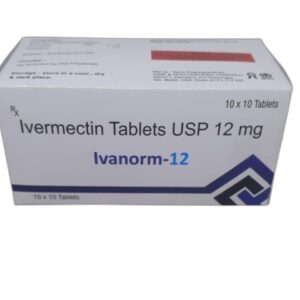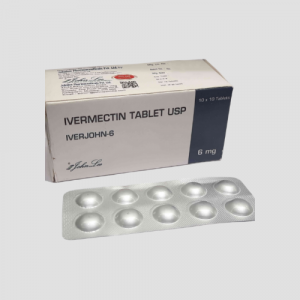Ivermectin 12mg Tablets (Ivercen 12)
Brand Name: Ivercen 12 mg
Generic Name: Ivermectin 12 mg
Shelf Life: 24 Months
Delivery Time: 6 – 15 Days
$78.00 – $146.00Price range: $78.00 through $146.00
Ivermectin is an antiparasitic drug that is used to treat a variety of parasitic infections in humans and animals. It works by binding to specific proteins in the parasites, causing paralysis and death. Some of the common parasitic infections that ivermectin is used to treat include river blindness, strongyloidiasis, and scabies.
Ivermectin has gained attention in recent times due to its potential as a treatment for COVID-19. While the efficacy of ivermectin in treating COVID-19 is still under investigation, some studies have suggested that it may have a role in reducing the severity of the disease and improving patient outcomes.
Other keywords associated with ivermectin include:
Antihelminthic: This refers to its ability to treat helminth infections, which are parasitic worms that can infect the digestive system, liver, and other organs.
FDA-approved: Ivermectin is an FDA-approved drug for the treatment of certain parasitic infections in humans and animals.
Off-label: The use of ivermectin for COVID-19 treatment is currently considered off-label, as it has not been specifically approved by the FDA for this purpose.
Oral medication: Ivermectin is typically administered orally in the form of tablets or capsules.
Low-cost: Ivermectin is a relatively inexpensive drug, which makes it an attractive option for use in developing countries with limited healthcare resources.
Side effects: While generally considered safe, ivermectin can cause side effects such as dizziness, nausea, and diarrhea. It can also interact with certain medications, so it’s important to talk to a healthcare provider before taking it.
| Packing Size | 100 Pills, 200 Pills |
|---|
Related products
-
Ivermectin Tablets
Ivermectin 12mg (Ivanorm 12mg) Tablets
$78.00 – $148.00Price range: $78.00 through $148.00 -
Ivermectin Tablets
Ivermectin 3mg (Iverjohn-3) Tablets
$72.00 – $200.00Price range: $72.00 through $200.00 -
Ivermectin Tablets
Ivermectin 6 mg Tablet (Iverjohn 6)
$75.00 – $145.00Price range: $75.00 through $145.00 -
Ivermectin Tablets
Ivermectin 12mg Tablet (Iverjohn 12)
$78.00 – $148.00Price range: $78.00 through $148.00




